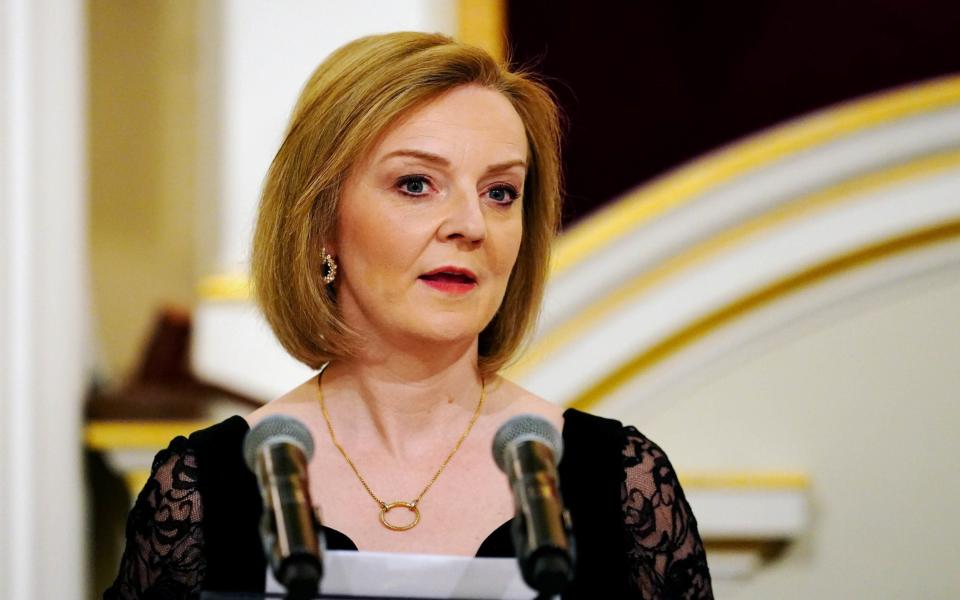Northern Ireland Protocol ‘to be scrapped’ as Sinn Fein celebrates historic victory

Britain is preparing to unilaterally override the post-Brexit border arrangement to avoid the Northern Ireland crisis “dragging on and on”, government sources have claimed, as Sinn Fein won the largest share of seats in Stormont for the first time on Saturday night.
Liz Truss has concluded that negotiations with the EU have almost “run out of road”, after Maros Sefcovic, the EU’s Brexit negotiator, told her that Brussels will “never” back down on its refusal to overhaul the Northern Ireland Protocol, according to government sources.
A source close to the Foreign Secretary described the remark as “alarming” after she repeatedly called for member states to redraw Mr Sefcovic’s mandate in order to allow for a breakthrough in the talks.
Ministers are concerned about disruption being caused to businesses by customs checks on British goods sent to Northern Ireland, and the Democratic Unionist Party has indicated that it will refuse to form an executive with Sinn Fein until the problems are resolved.
Sinn Fein won 27 of the 90 Stormont seats, putting it ahead of the Democratic Unionist Party (DUP) which fell by two seats to 25.
It is the first time a party seeking a united Ireland will have topped the poll in the elections for the Northern Ireland executive, with a unionist party until now the largest in government since the province was formed in 1921.
Writing in The Telegraph, Sir Jeffrey Donaldson, the DUP leader, piled pressure on Ms Truss and Boris Johnson to act, saying: “Every unionist candidate standing in the election stood in opposition to the Protocol and attracted some 360,000 votes. Forty per cent of all votes cast were explicitly for parties who opposed the Protocol.
“Given that the political institutions in Northern Ireland operate on the basis of cross-community consensus, the lack of any unionist support for the Protocol means that it is unworkable as it does not command sufficient consensus.”
He added: “The electorate has spoken. The view of unionism is clear. Now is the moment for the Government to act. No more words. It’s time for action.
“The Irish Sea border must go and the Protocol must be replaced by arrangements that restore Northern Ireland’s place within the United Kingdom internal market.”
Sir Jeffrey set out seven tests for any plan to override the Protocol, including that any new arrangement must avoid a border in the Irish Sea.

Government sources indicated that ministers were drawing up proposals for such a move, despite the Conservatives denying reports that a bill setting out a replacement arrangement would be included in next week’s Queen’s Speech.
In a telephone call with Ms Truss on April 28, Mr Sefcovic is said to have “made clear... that the EU did not have, and in his view would never have, a mandate to renegotiate the Protocol or to go beyond their existing proposals”, according to a government source.
A source close to Ms Truss said: “The admission made by Sefcovic on the call is alarming. Liz’s first, second and third priority in all this is protecting peace made and stability in Northern Ireland. Clearly, the situation is getting increasingly urgent, and the feeling is we can’t let this crisis drag on and on.
“It feels like we have run out of road with negotiations unless something significant happens in terms of the EU changing its position.”
Mr Sefcovic is understood to insist that unilateral action by the UK would not solve the problems on the island of Ireland, and that the threat of such a move will not help to strengthen Ms Truss’s hand in the negotiations.

Theresa Villiers, the former Northern Ireland Secretary, said: “We must deal with the Protocol. It must be radically changed or replaced. We can’t continue as we are. The people who really need to listen and wake up as a result of this election result are the EU and the Commission.
“If negotiation isn’t going to do the business, we need unilateral legislation. We need to be getting on with it even if we don’t implement it straight away.”
A Foreign Office source said: “It’s incredibly disheartening that despite the political and economic damage the Protocol is causing in Northern Ireland, the Commission continues to adopt such a rigid and hard-line negotiating position.
“The Belfast (Good Friday) Agreement is being undermined and the situation is now very serious. Both the Prime Minister and Foreign Secretary have always been clear that action will be taken if solutions can’t be found.
“The Assembly elections are now over and we need to see the EU move significantly. Our focus has been, and will continue to be, preserving peace and stability in Northern Ireland.”
On Saturday, Sinn Fein called for an immediate resumption of the power-sharing executive.
Mary Lou McDonald, the party’s president, urged unionists “not to be afraid”, saying “the future is bright for all of us”.
Ms McDonald said there was a collective responsibility to get the government “up and running quickly”.
She added: “This is not a time for theatrics, this is not a time for playing games, this is the time for grown-up sensible partnership politics, that’s what people want.
“The idea, at a time of a cost-of-living crisis, that people would stand on the sidelines and allow people to struggle, and struggle badly for us is unthinkable, so we would appeal to everybody to take stock.”
A spokesman for the US government said political leaders should "take the necessary steps" to re-establish a power-sharing executive.
Ned Price, from the US Department of State, said: "We call on Northern Ireland's political leaders to take the necessary steps to re-establish a power-sharing executive, which is one of the core institutions established by the Belfast/Good Friday Agreement.
"Critical and immediate challenges concerning the economy, health, and education are best addressed through the collective efforts of a devolved government chosen by, and accountable to, its people.
"The United States enjoys a deep and long-standing relationship with Northern Ireland, grounded in ties of kinship, culture, commerce, and shared values.
"We remain deeply committed to preserving the peace dividend of the Belfast/Good Friday Agreement and will always strive to protect these gains for all communities.
"We look forward to continuing our work with democratic partners in Northern Ireland, and with the governments of the United Kingdom and Ireland, to support peace, prosperity, and stability across the region."

 Yahoo News
Yahoo News 